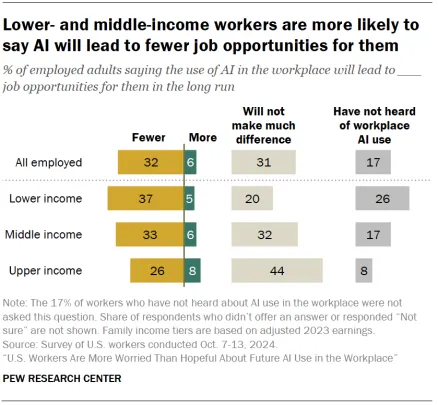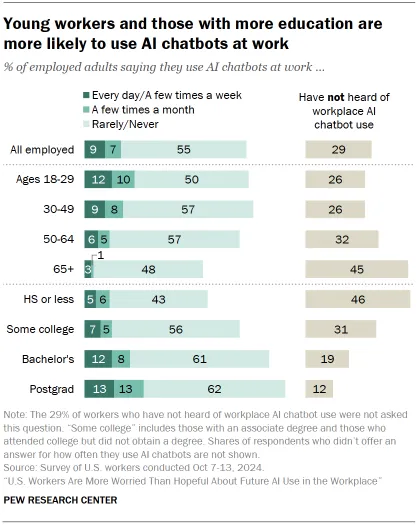As Meta continues to push its AI fashions into extra components, and X promotes its newest Grok 3 AI mannequin, this new report from Pew Analysis comes at an fascinating time in assessing the probably influence of AI on the workforce.
Pew Analysis surveyed 5,395 U.S. adults to learn the way they really feel concerning the potential impacts of AI, and whether or not they’re utilizing AI instruments of their day-to-day actions.
And the outcomes present that almost all of employees are “apprehensive” about AI’s impacts within the office, versus seeing AI instruments as a method to maximise productiveness.
As you possibly can see on this overview, 52% of respondents indicated that they’ve issues concerning the future influence of AI use within the office. Along with this, 32% imagine that AI will result in fewer job alternatives in future.
Which is smart. Massive companies are methods wherein they’ll change human labor with AI instruments, whereas even the U.S. authorities is exploring AI instruments to streamline its operations.
It appears inevitable {that a} portion of roles will probably be changed, or lowered by AI techniques, although generally, generative AI instruments as they at the moment stand not less than, are not any alternative for human experience and data.
They will complement that experience, and enhance effectivity in consequence. However to be able to get probably the most out the present wave of AI instruments, you could have an understanding of the outputs, and the potential flaws and errors that AI techniques could make. If you realize these, you then refine and enhance these outputs right into a extra practical, dependable working order, versus counting on them blindly.
Although that’s unlikely to cease companies from leaning into potential price financial savings because of AI integrations, which can be mirrored on this query associated to future job alternatives.

As you possibly can see, simply 6% of individuals imagine that office AI use will result in extra job alternatives for them in the long term. 32% imagine that it’ll result in fewer alternatives, whereas 31% imagine it gained’t make a lot distinction.
You’ll be able to see, too, that decrease earnings employees imagine they’re most certainly to be impacted, as companies look to make use of AI logic to remove extra binary duties.
And as you’ll count on, youthful customers are those most certainly to be making use of AI instruments already:

Staff aged 18 to 29 are the most certainly to make use of AI chatbots at work, whereas these with greater schooling ranges are additionally extra prone to be utilizing AI of their course of.
The developments make sense, and it’ll be fascinating to see how AI impacts the way forward for work as these youthful, AI-native audiences filter into the workforce, and whether or not the usage of AI chatbots will increase effectivity, or decreases data.
That’s a key concern, that whereas instruments like ChatGPT can provide the solutions, that doesn’t change actual understanding and expertise. Which might result in extra individuals with the ability to get the correct consequence, however not essentially understanding why, nor methods to enhance or refine such.
And which will really make actual expertise and data much more useful in future.
Both means, some fascinating notes on the state of the AI shift.
You’ll be able to take a look at Pew Analysis’s full AI within the office report right here.



